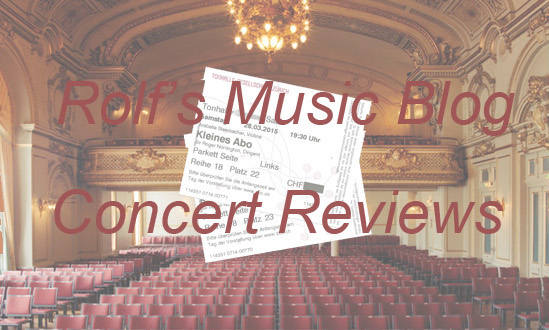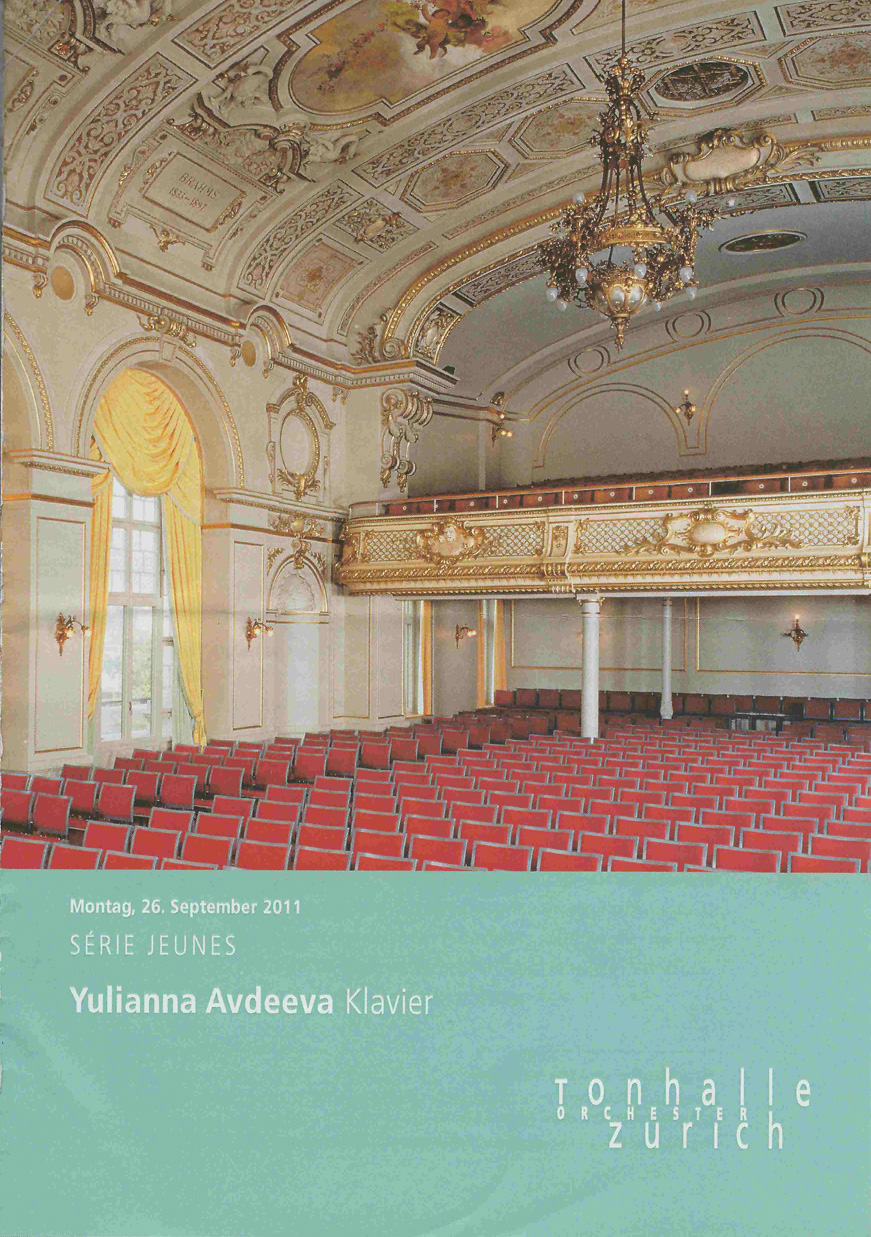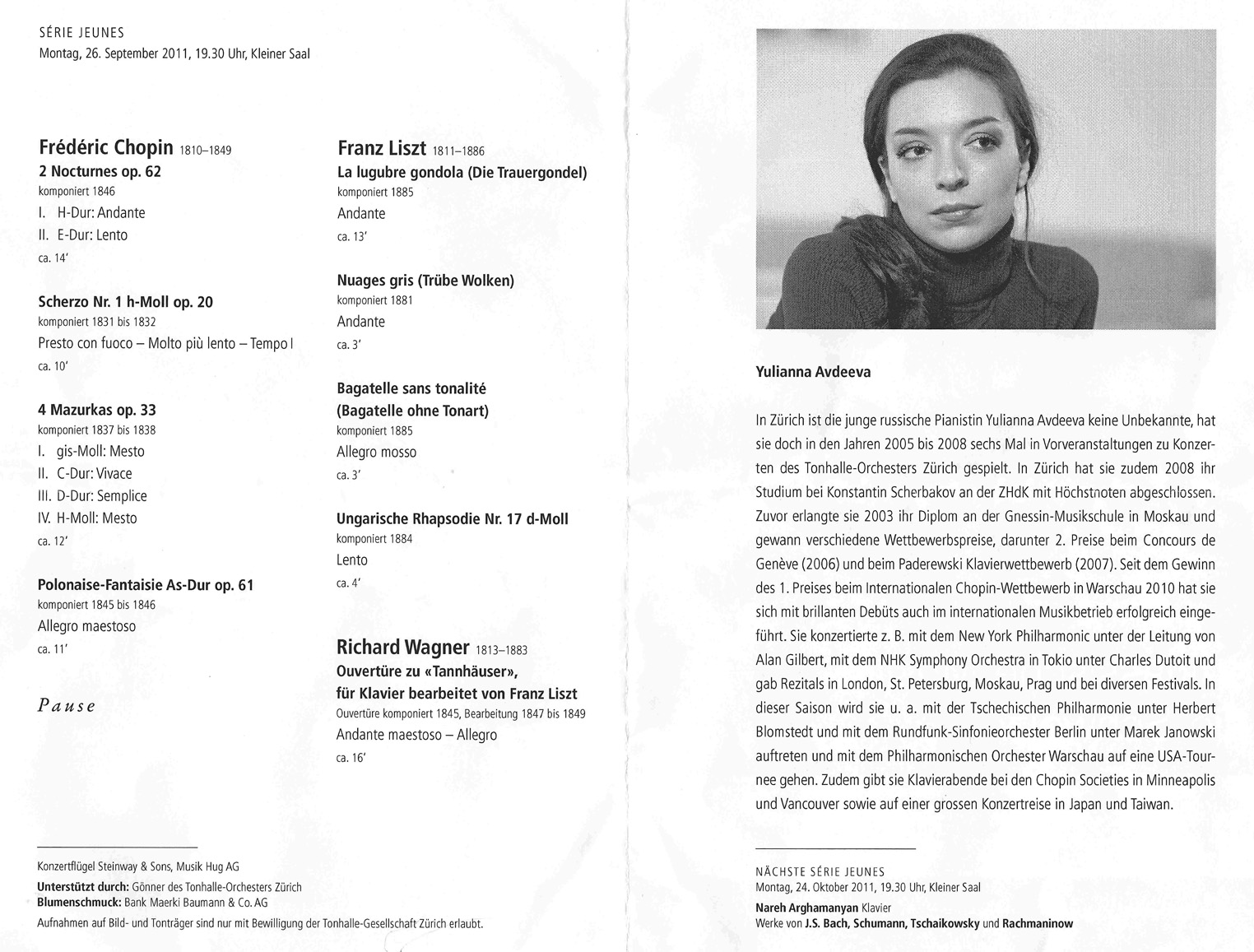
Concerts, Upcoming & Past…
Below you find a list of concerts that I consider attending (or have attended); this is merely for information. The occurrence of an event does not imply endorsement or promotion (nor do I promise reviewing each and every one of these concerts). All concerts are in Switzerland, unless noted otherwise.
My concert reviews typically appear a within a week after the event; if you want to be notified about newly published reviews, please subscribe to the blog, in the sidebar.
| Category | Year | ||||||||||||
|---|---|---|---|---|---|---|---|---|---|---|---|---|---|
| Any | Upcoming | 2024 | 2023 | 2022 | 2021 | 2020 | 2019 | 2018 | 2017 | 2016 | 2015 | 2014 | All |
| Chamber Music | Upcoming | 2024 | 2023 | 2022 | 2021 | 2020 | 2019 | 2018 | 2017 | 2016 | 2015 | 2014 | All |
| Chamber Play | Upcoming | — | — | — | — | — | 2019 | — | 2017 | — | — | — | All |
| Choir / Oratorio | Upcoming | 2024 | — | 2022 | 2021 | 2020 | 2019 | 2018 | 2017 | 2016 | 2015 | 2014 | All |
| Lied Recital | Upcoming | — | 2023 | — | — | 2020 | 2019 | 2018 | 2017 | 2016 | — | — | All |
| Opera | Upcoming | — | — | — | — | — | 2019 | — | 2017 | 2016 | — | — | All |
| Orchestra | Upcoming | 2024 | 2023 | 2022 | 2021 | 2020 | 2019 | 2018 | 2017 | 2016 | 2015 | 2014 | All |
| Piano Recital | Upcoming | 2024 | 2023 | 2022 | 2021 | 2020 | 2019 | 2018 | 2017 | 2016 | 2015 | 2014 | All |
| Solo Recital | Upcoming | 2024 | — | 2022 | 2021 | 2020 | 2019 | 2018 | — | — | — | — | All |
Event Information:
-
Piano Recital: Yulianna Avdeeva
Tonhalle Zurich, 2011-09-26
2011-10-09 — Original posting (on Blogger)
2012-02-29 — Updated
2014-10-28 — Re-posting as is (WordPress)
2016-06-19 — Brushed up for better readability

Table of Contents
Introduction
In my earlier postings, "Encounters with Yulianna Avdeeva" and "On Yulianna Avdeeva's Success in Warsaw 2010" I wrote about how my wife and I heard the artist for the first time(s), and how I followed the Chopin competition in Warsaw. Of course, I was hoping for opportunities to hear her again; but as I was busy throughout the year. Normally my job does not allow me to visit concerts throughout the week (still a couple of years to my retirement, then hopefully this will change!). So, I did not even follow the concert agenda in Zurich. It was almost pure coincidence (actually a posting on the Yulianna Avdeeva fan club page in Facebook) that pointed me to her appearance in Zurich on Monday, September 26th, 2011:
Venue and Program
The venue was the "kleiner Tonhallesaal", a small, nice concert hall holding about 650 people. A week before the event, when I was checking, the hall was not sold out yet. The best seats were gone, sure, but I managed to get a reasonable seat. On the evening itself, the event was pretty much sold out. Here's the program for the concert (click on the image to see a larger view):

I'm not a professional concert reviewer — but unfortunately, the media largely ignored this event. At least the two newspapers that I checked (the Neue Zürcher Zeitung and our local newspaper) did not review the concert at all. So let me try giving at least some rudimentary, subjective comments on how I experienced the evening. I don't have scores or recordings of several of the pieces in the program, so this will be fragmentary at best — sorry! Where I mention other interpretations I don't mean this as comparison or as relative rating (nor do I imply that these other interpretations are reference recordings). I merely want to be clear what some of the basis for my comments is.
Frédéric Chopin (1810 - 1849)
Nocturnes, op.62
Yulianna Avdeeva devoted the first half of the program (up to the break) to compositions by Frédéric Chopin, the second part featured Franz Liszt. In many ways it is understandable that artists start an evening with "easier" pieces, in the case of the two Nocturnes op.62. We heard these pieces in the order in which the composer arranged them.
At the same time, I personally regretted that choice here. In Yulianna Avdeeva's hands, op.62/1 is so full of emotions, so subtle, with passages going down to pppp, almost whispered (at the end I was almost touched to tears!) — and this was the start of the evening! The real pity here was that it took the artist and the audience about half a minute to get used to each other, to adapt to the acoustics. I'm tempted to say that the first bars, probably the first half-minute, were lost. I would have preferred if she had played op.62/2 first. Better even, she might have started the program with the Mazurki op.33 —
Scherzo No.1
In preparation for the Scherzo No.1 in B minor, op.20 I listened to Pollini's 1990 recording. My impression was that Yulianna Avdeeva played this faster, more subtle and more fluent than Pollini, and full of emotions (as expected!). Pollini's interpretation sounds crystal clear, accurate, virtuosic, but also a bit (in parts) like an Etude.
Mazurki, op.33
In Yulianna Avdeeva's hands, the four Mazurki, op.33 turned into very nice and lively folk dances. That's what they are really meant to be. I particularly liked No.2 (D major).
Polonaise-Fantaisie op.61
No surprises with the Polonaise-Fantaisie in A♭ major, op.61. We have heard this played by Yulianna Avdeeva during the competition, and we know how well she can (and does) play it! In this piece, she does not try to exhibit virtuosity or to excel as "Tastenlöwe" (keyboard lion?): this is not mere show, it comes from her heart. On the other hand I felt that she played with intelligent dramaturgy, with controlled dynamics, not just mere emotions. I like how she made this music transparent, enabling the listener to follow the many layers / voices.
Franz Liszt (1811 - 1886)
Yulianna Avdeeva devoted the programmed part after the break to compositions by Franz Liszt. Prior to the concert, I listened to recordings of "Lugubre Gondola" (No.1: Pollini, 1990) and "Nuages Gris" (Pollini, 1990 and Hamelin, 1996). I wondered why Yulianna Avdeeva was placing such depressive pieces in the core part of her program! Luckily, my worries were unnecessary!
La Lugubre Gondola, S.200/1
Yes, the mood in "La Lugubre Gondola" is sad, at least in the first part, and there is loneliness, but this is not Charon's ferry over the Styx, and the devastating sensation of having lost all the memory of the past that I experience with Pollini's recording: in Yulianna Avdeeva's interpretation there is mourning, sadness, pain. But then (especially in part 2), I also pictured an opening to heaven(?), memories / looking back to a dead person's life and achievements, also consolation. It was by no means as sad as I anticipated, overall!
Nuages Gris, S.199
Similarly with "Nuages Gris". In Yulianna Avdeeva's hands this is not just about the depressing mood on a day covered with dark gray clouds: in her interpretation. There was a lot of tension, the concrete threat of an upcoming thunderstorm. But there were also contemplative moments, maybe patches of blue sky in-between?
Bagatelle sans Tonalité, S.216a
Yulianna Avdeeva presented an excellent, masterful interpretation of Liszt's "Bagatelle sans Tonalité"; was this now diabolic or rather mischievous, waggish, or joking?
Hungarian Rhapsody No.17, S.244/17
The Bagatelle turned into an introduction to the Hungarian Rhapsody No.17 in D minor: Yulianna Avdeeva attached it without break, which confused some people who felt that she omitted the Rhapsody. I'm not sure whether this immediate transition was a planned step or rather the inspiration of that very moment. In any case, for me, it certainly made sense from a musical point-of-view. The two pieces are also a good match in their character.
Liszt / Wagner
The final point in the program was Liszt's Piano Transcription, S.442, of the Overture to Richard Wagner's opera "Tannhäuser". The actual composition is of course mostly Wagner. Liszt's contribution is a dramatic, breathtaking piano transcription, a monster piece of more than 15 minutes. It is a universe of moods and feelings, from the solemn, quiet beginning to the overwhelming, never-ending apotheosis at the end. And it appears to require the power and the abilities of a super virtuoso.
I must say: I was speechless, absolutely floored by this interpretation. She lived this music with all its rich emotions, evoked the spirit of Wagner's Music. And she mastered all the enormous difficulties of the score. I was very touched and in total emotional turmoil after this piece. I felt that after this I don't need to listen to pianists such as Hamelin or Volodos: Yulianna Avdeeva can do it just as well!
A little aside: there's a YouTube recording (just the audio, unfortunately) of Yulianna Avdeeva playing this piece in Montpellier in July 2011:
I think her performance in this concert in Zurich was actually better, and I'm happy to have witnessed it!
Encores
Understandably, there was a lot of applause after this piece. Yulianna Avdeeva played Liszt's Nocturne No.3 in A♭ major, "Liebestraum" / "Rêve d'Amour" — for myself, I would have preferred leaving with the rich impressions from the last piece in the program, but the "Liebestraum" is actually a good fit & ending as well ...
The audience asked for more! The artist then played Chopin's Waltz No.5 ("Grande Valse") in A♭ major, op.42. This was later followed by another short piece by Chopin. For me personally, these were not the best fit. After the Tannhäuser transcription, the Waltz appeared to be too fast. Maybe, Yulianna Avdeeva also didn't play it as diligently as if it had been in the regular part of a program? This might have been a better starting piece! But, if the public can't stop asking for more, the artist presumably needs to make a fast decision about an encore. Otherwise she might disappoint some people in the audience. I would have preferred the latter!

